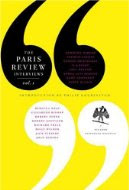My stand-out favorite is with editor Robert Gottlieb, in which writers (Joseph Heller, Doris Lessing, John Le Carre, Toni Morrison, Michael Crichton among others) comment on working with Gottlieb and he responds -- it’s illuminating and hilarious! But all of the interviews are terrific, and I found myself marking passages throughout. Decided to pull one takeaway from each of the renowned novelists, poets and screenwriters to post here. (I’m all about “short,” so will post half today and half tomorrow.)
Saul Bellow, about sources of inspiration:
I suppose that all of us have a primitive prompter or commentator within, who from earliest years has been advising us, telling us what the real world is. […] When E.M. Forster said, “How do I know what I think until I see what I say?” he was perhaps referring to his own prompter.
Elizabeth Bishop, about childhood:
You are fearfully observant then. You notice all kinds of things, but there’s no way of putting them all together.
Jorge Luis Borges:
When a writer is young he feels somehow that what he is going to say is rather silly or obvious or commonplace, and then he tries to hide it under baroque ornament […] Whenever I find an out-of-the-way word, […] a word that is different from the others, then I strike it out, and I use a common word. I remember that Stevenson wrote that in a well-written page all the words should look the same way. If you write an uncouth word or an astonishing or an archaic word, then the rule is broken; and what is far more important, the attention of the reader is distracted by the word.
James M. Cain, about formula writing:
You seem to think there’s some way you can transform this equation, and transform it, and transform it, until you arrive at the perfect plot. It’s not like that. The algebra has to be right, but it has to be your story. […] If it’s too easy you have to worry. If you’re not lying awake at night worrying about it, the reader isn’t going to, either. […] There are problems to be solved. […] Suspense comes from making sure your algebra is right.
Truman Capote:
I believe in hardening yourself against opinion. […] Never demean yourself by talking back to a critic, never. Write those letters to the editor in your head, but don’t put them on paper.
Joan Didion:
I generally have a point of view, although I don’t usually recognize it. Something about a situation will bother me, so I will write a piece to find out what it is that bothers me.
T.S. Eliot, about unfinished work:
It’s better, if there’s something good in it that I might make use of elsewhere, to leave it at the back of my mind than on paper in a drawer. If I leave it in a drawer it remains the same thing but if it’s in the memory it becomes transformed into something else.
Jack Gilbert, about writers’ complaints that writing is difficult:
They should try working in the steel mills in Pittsburgh. That’s a very delicate kind of approach to the world -- to be so frail that you can’t stand having to write poetry.
Tomorrow: Part II





To each his own. For T.S. Eliot, it's best to keep an unfinished piece at the back of the mind so it can transform. For other writers, it's best to put it down on paper so as to see it more objectively; even when down on paper, it's still at the back of the mind, and there it can morph into something else.
ReplyDeleteAgree; and each reader of the Interviews will find resonance in different passages. Your comment prompts me to look closer at passages I DISagree with and explore why; probably much learning in that.
ReplyDelete